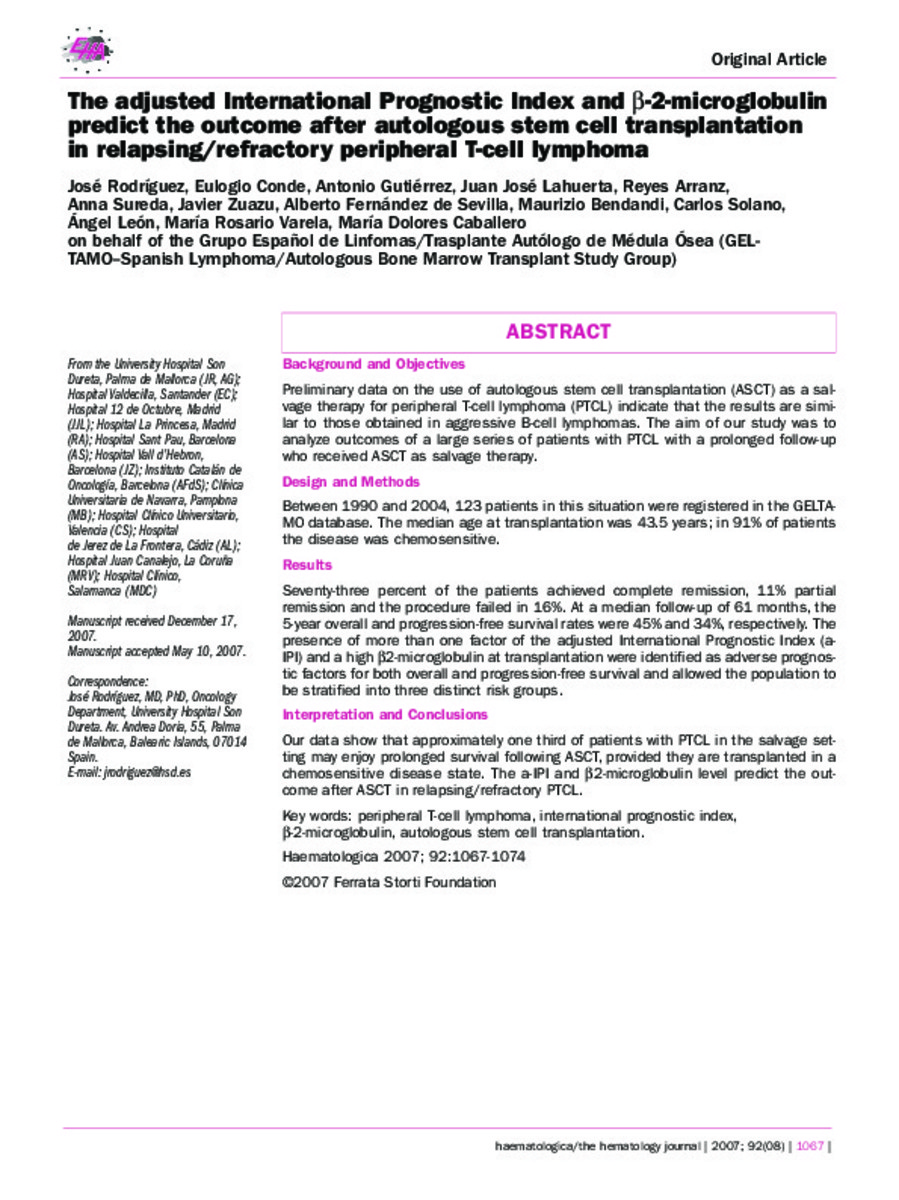Full metadata record
| DC Field | Value | Language |
|---|---|---|
| dc.creator | Rodriguez, J. (José) | - |
| dc.creator | Conde, E. (Eulogio) | - |
| dc.creator | Gutierrez, A. (Antonio) | - |
| dc.creator | Lahuerta, J.J. (Juan José) | - |
| dc.creator | Arranz, R. (Reyes) | - |
| dc.creator | Sureda-Balari, A. M. (Anna Maria) | - |
| dc.creator | Zuazu, J. (Javier) | - |
| dc.creator | Fernandez-de-Sevilla, A. (A.) | - |
| dc.creator | Bendandi, M. (Maurizio) | - |
| dc.creator | Solano, C. (C.) | - |
| dc.creator | Leon, A. (Angel) | - |
| dc.creator | Varela, M.R. (María Rosario) | - |
| dc.creator | Caballero, M.D. (M.D.) | - |
| dc.creator | Grupo Español de Linfomas/Trasplante Autólogo de Médula Ósea (GEL-TAMO) | - |
| dc.date.accessioned | 2011-11-30T12:38:15Z | - |
| dc.date.available | 2011-11-30T12:38:15Z | - |
| dc.date.issued | 2007 | - |
| dc.identifier.citation | Rodriguez J, Conde E, Gutierrez A, Lahuerta JJ, Arranz R, Sureda A, et al. The adjusted International Prognostic Index and beta-2-microglobulin predict the outcome after autologous stem cell transplantation in relapsing/refractory peripheral T-cell lymphoma. Haematologica 2007 Aug;92(8):1067-1074. | es_ES |
| dc.identifier.issn | 1592-8721 | - |
| dc.identifier.uri | https://hdl.handle.net/10171/20025 | - |
| dc.description.abstract | BACKGROUND AND OBJECTIVES: Preliminary data on the use of autologous stem cell transplantation (ASCT) as a salvage therapy for peripheral T-cell lymphoma (PTCL) indicate that the results are similar to those obtained in aggressive B-cell lymphomas. The aim of our study was to analyze outcomes of a large series of patients with PTCL with a prolonged follow-up who received ASCT as salvage therapy. DESIGN AND METHODS: Between 1990 and 2004, 123 patients in this situation were registered in the GELTAMO database. The median age at transplantation was 43.5 years; in 91% of patients the disease was chemosensitive. RESULTS: Seventy-three percent of the patients achieved complete remission, 11% partial remission and the procedure failed in 16%. At a median follow-up of 61 months, the 5-year overall and progression-free survival rates were 45% and 34%, respectively. The presence of more than one factor of the adjusted International Prognostic Index (a-IPI) and a high beta2-microglobulin at transplantation were identified as adverse prognostic factors for both overall and progression-free survival and allowed the population to be stratified into three distinct risk groups. INTERPRETATION AND CONCLUSIONS: Our data show that approximately one third of patients with PTCL in the salvage setting may enjoy prolonged survival following ASCT, provided they are transplanted in a chemosensitive disease state. The a-IPI and beta2-microglobulin level predict the outcome after ASCT in relapsing/refractory PTCL. | es_ES |
| dc.language.iso | eng | es_ES |
| dc.publisher | Ferrata Storti Foundation | es_ES |
| dc.rights | info:eu-repo/semantics/openAccess | es_ES |
| dc.subject | Peripheral T-cell lymphoma | es_ES |
| dc.subject | International prognostic index | es_ES |
| dc.subject | β-2-microglobulin | es_ES |
| dc.subject | Autologous stem cell transplantation | es_ES |
| dc.title | The adjusted International Prognostic Index and beta-2-microglobulin predict the outcome after autologous stem cell transplantation in relapsing/refractory peripheral T-cell lymphoma | es_ES |
| dc.type | info:eu-repo/semantics/article | es_ES |
| dc.relation.publisherversion | http://www.haematologica.org/content/92/8/1067.long | es_ES |
Files in This Item:
Statistics and impact
Items in Dadun are protected by copyright, with all rights reserved, unless otherwise indicated.






